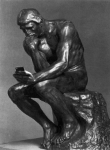Photo copyright Matthias Creuziger
We're already hard at work with our next new production and world premiere. The piece is called "Die Antilope," and was written by Johannes Maria Staud, an Austrian composer, who also happened to celebrate his 40th birthday yesterday. Happy Birthday, Johannes! The other night, we shared a meal after rehearsal here in Luzern, and although it was immediately obvious to me when I met him for the first time a few months ago, it occurred to me again just how warm-hearted a person he is, in addition to being an exciting compositional talent.
The libretto for Die Antilope is an original creation by poet and author, Durs Grünbein, who, together with the composer, developed the thematic ideas with inspiration from such works as Eleutheria by Samuel Beckett, Herman Melville's Bartleby, as well as Martin Scorsese's After Hours. The characters for our piece are based on cardboard cut-out versions of office colleagues, secretaries, and bosses, as well as detached young adult smart phone addicts, bag-ladies, sadistic doctors, and over-sharing middle-aged women. The opening scene of the opera finds the main character, Victor, at a business party. He is unwilling or unable to join in the celebration or to connect with any of the other characters, and inexplicably throws himself out of the 13th-story window. Before he does so, he sings an aria in which he lists the names of dozens of different types of antelopes from all over the world. The following scenes find Victor in a series of sometimes bizarre, sometimes ordinary situations where he interacts with the other characters or the environment in his own peculiar way.
Playing the part of Victor has posed challenges for me. It's a part so unlike any other part I've played before that at first I was at a loss. During the learning process, I of course knew that Victor would need to be the golden thread which ties the whole production together, but unfortunately for me, he hardly speaks a single coherent word in the whole piece. So I had only a few clues as to his motivations for doing anything at all. The plot (not to be confused with 'storyline' because it's not a story in the normal sense of the word), is a set of abstract scenes, where Victor is present but separate, and in most cases doesn't say anything or speaks in backwards Baudelaire text, or disjointed Esperanto, or just says 'rrrrrrrrrrrrrrrrrrrr.'
Es·pe·ran·to
ˌespəˈräntō/
noun
an artificial language devised in 1887 as an international medium of communication, based on roots from the chief European languages.
Victor's isolation was obviously a crucial focus to the piece, and realizing this was my first step toward breaking the code. Then I had to decide if the isolation was externally imposed or self-imposed. Unfortunately, the answer I came up with was: both and neither. In some scenes, the other characters desire Victor's company and interaction, in other scenes, he is pushed away. Likewise, he sometimes seems to want to communicate something (he doesn't necessarily have to speak at all! He didn't have to go to the party, etc.), but he also rejects interaction as often as he seeks it. So Victor needs to have sympathetic aspects as well as repellent. Don't we all? The repellent things about him were relatively easy to find, but the sympathetic side took a bit of digging.
Mercifully, Mr. Grünbein wrote an short monologue for Victor in the fourth scene when he encounters an abstract sculpture. Initially, I thought the aggressive rant was tongue in cheek; a self-conscious critique of his own work (Grünbein's). But following Victor's outburst, the sculpture begins to speak to him his own language. During the sculpture's aria, he takes a closer look, cleans off some bird droppings, and falls asleep beneath it. I realized it could be seen as a metaphor for Victor's own inner struggle. That his monologue, though directed angrily at the sculpture, could be seen as frustration with himself for his own shortcomings. Directly following this scene, he sings for the first time in German when he lands comfortably (and inexplicably) in the middle of a zoo among the animals. It is as if he's had an emotional breakthrough and in learning to appreciate the sculpture, or at least to accept it, Victor learns self-appreciation.
We still have two weeks before the premiere now, but I'm feeling more and more comfortable with this enigmatic character, and hopefully, I'll continue to find ways to relate to him and create a bridge for the audience into a piece which is, let's be honest, not for beginners.
Hopefully, I'll manage to write another update before the premiere. Stay tuned!



